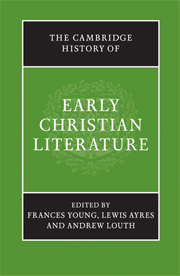Book contents
- Frontmatter
- PART ONE The Beginnings: The New Testament to Irenaeus
- PART TWO THE THIRD CENTURY
- PART THREE FOUNDATION OF A NEW CULTURE: FROM DIOCLETIAN TO CYRIL
- A LITERARY GUIDE
- 21 Classical genres in Christian guise; Christian genres in classical guise
- 22 Arnobius and Lactantius
- 23 Eusebius and the birth of church history
- 24 The fourth-century Alexandrians: Athanasius and Didymus
- 25 Palestine: Cyril of Jerusalem and Epiphanius
- 26 The Cappadocians
- 27 Fourth-century Latin writers: Hilary, Victorinus, Ambrosiaster, Ambrose
- 28 Jerome and Rufinus
- 29 Augustine
- 30 John Chrysostom and the Antiochene School to Theodoret of Cyrrhus
- 31 Cyril of Alexandria
- 32 Hagiography
- 33 Ephrem and the Syriac Tradition
- 34 The literature of the monastic movement
- 35 Women and words: texts by and about women
- 36 Conciliar records and canons
- B CONTEXT AND INTERPRETATION
- Bibliographies
- Index
- Map: The Roman Empire in the late fourth century AD"
- References
32 - Hagiography
from A - LITERARY GUIDE
Published online by Cambridge University Press: 28 March 2008
- Frontmatter
- PART ONE The Beginnings: The New Testament to Irenaeus
- PART TWO THE THIRD CENTURY
- PART THREE FOUNDATION OF A NEW CULTURE: FROM DIOCLETIAN TO CYRIL
- A LITERARY GUIDE
- 21 Classical genres in Christian guise; Christian genres in classical guise
- 22 Arnobius and Lactantius
- 23 Eusebius and the birth of church history
- 24 The fourth-century Alexandrians: Athanasius and Didymus
- 25 Palestine: Cyril of Jerusalem and Epiphanius
- 26 The Cappadocians
- 27 Fourth-century Latin writers: Hilary, Victorinus, Ambrosiaster, Ambrose
- 28 Jerome and Rufinus
- 29 Augustine
- 30 John Chrysostom and the Antiochene School to Theodoret of Cyrrhus
- 31 Cyril of Alexandria
- 32 Hagiography
- 33 Ephrem and the Syriac Tradition
- 34 The literature of the monastic movement
- 35 Women and words: texts by and about women
- 36 Conciliar records and canons
- B CONTEXT AND INTERPRETATION
- Bibliographies
- Index
- Map: The Roman Empire in the late fourth century AD"
- References
Summary
Lives of the saints became one of the most popular forms of Christian literature: indeed for some periods of the Middle Ages, both in the East and the West, our literary sources are dominated by the hagiographical. The earliest Christian biography extant is the Life of St Cyprian of Carthage (d. 258), by his deacon Pontius, but the most influential without doubt is the Life of St Antony, by his contemporary, the pope of Alexandria, Athanasius. Another early Christian biography is the Life of Origen, which originally formed part of the Defence of Origen, written by Pamphilus and Eusebius of Caesarea in the first decade of the fourth century: it is now lost, but it was almost certainly the source for most of book 6 of Eusebius’ History of the Church, which is mainly concerned with the life of the great Alexandrian. Both this lost Life of Origen and the Life of St Antony demonstrate marked similarities with the pagan genre of the Lives of the philosophers, which must therefore be counted as a literary source for the genre of the saints’ Lives. However, the nature of the saint’s Life, from its beginnings, was more deeply affected by the emerging Christian cult of the saint, of which the Life soon came to form a part. The cult of the saint was originally the cult of the martyr, a cult that can be traced back at least to the second century, as the Martyrdom of St Polycarp shows. The mortal remains of the martyr – the relics – were buried, if at all possible, and yearly commemorations, involving the celebration of the eucharist, were made at the place of burial.
Keywords
- Type
- Chapter
- Information
- The Cambridge History of Early Christian Literature , pp. 358 - 361Publisher: Cambridge University PressPrint publication year: 2004
References
- 3
- Cited by

